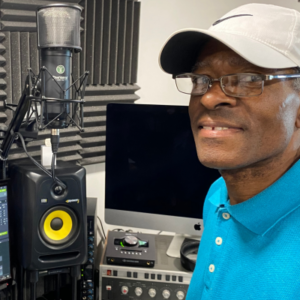Gladys Knight & the Pips continued their rise through the ranks at Motown, with the release of two albums and four singles in the course of 1968. Following the success of their version of “I Heard It Through The Grapevine” in 1967, they teamed up again with Norman Whitfield, who produced first the “Feelin’ Bluesy” album and then “Silk N’Soul”.

“Feelin’ Bluesy” only made the lower reaches of the Billboard 200 Albums Chart and number twelve on the Billboard R&B Albums Chart, despite the twelve songs on the album all being written by top Motown songwriters. “The End Of Our Road”, the opening track, co-written by Norman Whitfield, Barrett Strong and Roger Penzabene, was released as a single, peaking at number fifteen on the Billboard Hot 100 Singles Chart and number five on the Billboard R&B Singles Chart. A second single from the album was issued in May, “It Should Have Been Me”, which was co-written in 1963 for Kim Weston by Norman Whitfield and Mickey Stevenson. It only reached number forty on the Billboard Hot 100 Singles Chart.

Gladys Knight & the Pips
Photo: Rob Mieremet for Anefo (Wikimedia Commons)
“Silk N’Soul” follows a pattern that Berry Gordy had tried with a number of projects for the Temptations and the Supremes. Now Gladys Knight tried her hand at some Motown classics (“I Wish It Would Rain”, “Baby I Need Your Loving”, and “The Tracks Of My Tears”) mixed with some classic Pop hits (“Yesterday” and “You’ve Lost That Lovin’ Feelin’”). It wasn’t very likely that the Pips were going to match the originals, but the album did reach number eleven on the Billboard R&B Albums Chart and number one hundred and thirty-six on the Billboard 200 Albums Chart. Motown released “I Wish It Would Rain” as a single in August. It only reached number forty-one on the Billboard Hot 100 Singles Chart and number fifteen on the Billboard R&B Singles Chart.

Somehow the momentum gained in 1967 was lost. The covers album brought in extra income but did little or nothing to advance Gladys Knight as an artist. The group’s fourth single of that year was shared with Marvin Gaye (one side each), released on the Motown label instead of the usual Soul imprint. Gladys Knight’s version of “Just A Closer Walk With Thee” has an arrangement that does the song no favours. It has a very dated feel, unlike her other Motown recordings. Gladys Knight & the Pips had put themselves in a strong position within Motown following their success with “I Heard It Through The Grapevine”, but now it felt that they were back to square one.
To relaunch the group in 1969, songs were chosen from the best of the Motown songwriters to build a new studio album entitled “Nitty Gritty”, which was released on the Soul label in September. Two singles from the album were issued in advance, “Didn’t You Know (You’d Have To Cry Sometime)”/ “Keep An Eye” early in the year and “The Nitty Gritty”/ “Got Myself A Good Man” in June. The first single failed to chart, but the follow-up peaked at number nineteen on the Billboard Hot 100 Singles Chart and number two on the Billboard R&B Singles Chart. The first was a smooth Ashford & Simpson ballad, beautifully sung by Knight, while the second was a cover of a Lincoln Chase song that Shirley Ellis had taken to number eight on the Hot 100 in 1964. The public preferred the funky cover to the smooth original.

Gladys Knight & the Pips 1969
Photo: Fotocollectie Anefo (Wikimedia Commons)
The album has a good variety of styles thanks to the numerous songwriters/producers. Norman Whitfield was responsible for six of the twelve tracks, including the excellent “I Know I’m Losing You” and the sweet ballad “It’s Summer”. Ashford & Simpson produced the three songs they contributed, including “Keep An Eye”, which was the B-side to the year’s first single. There is also a good version of the classic “All I Could Do Was Cry” produced by Harvey Fuqua and Johnny Bristol with an arrangement by Joe Tex. Berry Gordy must have been pleased to hear the old song again! The best song on the album is hard to choose, but it could be “The Stranger”, written and produced by Ivy Jo Hunter. It has a typical Motown driving beat!
There was still time for one more release. A third single was issued entitled “Friendship Train”, backed by “Cloud Nine” from the recent album. Both tracks are the work of Barrett Strong and Norman Whitfield and they take Gladys Knight and the Pips into psychedelic Soul territory. Producer Whitfield is in his element as he builds the pounding song around bass, percussion (including conga drums) and wailing guitar, with Jerry Long conducting the orchestra. Knight powers the lead vocal against the Pips’ Gospel-style chant. It deserved to be another number one for the band, but they didn’t quite make it. The single peaked at number two on the Billboard R&B Singles Chart and number seventeen on the Billboard Hot 100 Singles Chart. But it was recognised as one of the best R&B performances of the year by a duo or group when it was nominated for the 1970 Grammy in that category. It was the group’s first nomination; they lost out to the Isley Brothers, but their first win wasn’t far off. “Midnight Train To Georgia” topped the poll in 1974, and they also won a Grammy Award on 2nd March 1974, for “Best Pop Vocal Performance by a Duo or Group” with the song “Neither One of Us”, drawn from the last major studio album released by Motown before the group’s switch from Motown to Buddah Records.
At last, the group had found some songs worthy of their talent!

















